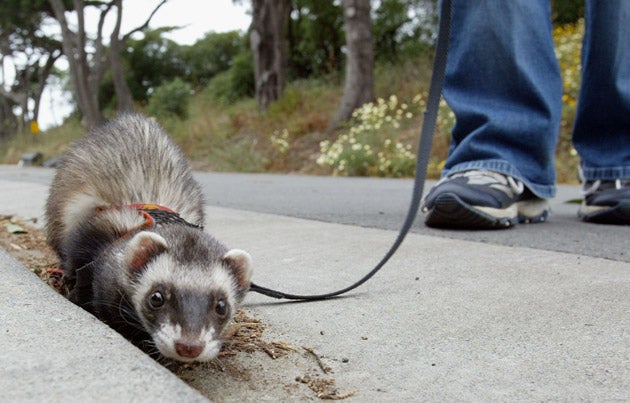Pet of the week: The ferret

Your support helps us to tell the story
From reproductive rights to climate change to Big Tech, The Independent is on the ground when the story is developing. Whether it's investigating the financials of Elon Musk's pro-Trump PAC or producing our latest documentary, 'The A Word', which shines a light on the American women fighting for reproductive rights, we know how important it is to parse out the facts from the messaging.
At such a critical moment in US history, we need reporters on the ground. Your donation allows us to keep sending journalists to speak to both sides of the story.
The Independent is trusted by Americans across the entire political spectrum. And unlike many other quality news outlets, we choose not to lock Americans out of our reporting and analysis with paywalls. We believe quality journalism should be available to everyone, paid for by those who can afford it.
Your support makes all the difference.Who's this funny little fellow? He's a ferret, traditionally the beloved companion of farmers throughout the land, though more recently he has been co-opted by people seeking an inquisitive, if rather pesky pet. In days of yore, the ferret would have been used as a highly efficient and ruthless vermin catcher. Nowadays, he's more likely to be found rummaging around in your sock drawer.
Is that how we get the expression "ferreting around"? I suppose so. They love digging, so you must bear this in mind when you are taking one on as a household pet. As young 'uns (or kits) they will play for hours with loo-roll holders, makeshift hammocks, balls, etc, but they are like "mini chainsaws" according to Lara Young of the GEM Ferret Care Group (gemferret.co.uk), so be prepared to make your house "ferret-proof". Anything is seen by the ferret as a plaything, and that means electrical cables, pot plants, framed photos, valuable family heirlooms – you have be warned!
Where does he come from? The same family as that former stalwart of this parish, the weasel; the male of the species is a hob and the female is a jill. They are legendary kippers, and will happily snooze the day away when they are not being stimulated. But mind where you sit yourself down, as they are wont to find cosy little corners on the sofa and just crash out.
How do I contain this energetic bundle of fun? If indoors, you must make sure they have a spacious cage – the British Ferret Club (britishferretclub.co.uk) says they like to sleep somewhere quiet and dark. Cleanliness is important to the ferret, so weekly cleaning of the cage is important, but their bedding doesn't need to be too elaborate – torn up bits of yesterday's Independent will do nicely. You can keep ferrets outside throughout the year – in a large rabbit hutch, for example – as long as their dwelling has plenty of bedding and is out of the wind. It is best to keep them in pairs – preferably neutered – as they will crave company when you are not around.
What about treats? There's nothing ferrets like more than a bit of fresh fruit or some cooked meat occasionally, but on the whole they should be fed on ferret mix which can be bought from most good pet stores.
Anything else? Yes. Ferrets can live up to 12 years, so be prepared for the long haul. You won't regret it, says Lara Young, they pay you back with love and affection in spades. If a furry friend's for you, go to a rescue centre – the ferret will only cost you the price of a donation, and the staff will be on hand to give you lots of advice.
Join our commenting forum
Join thought-provoking conversations, follow other Independent readers and see their replies
Comments